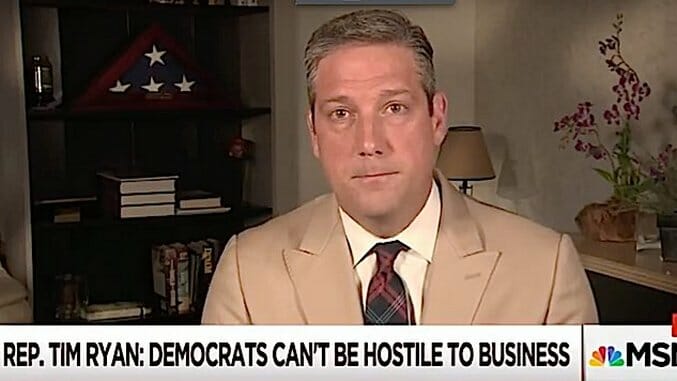What’s With Democrats Who Sound Like Paul Ryan on Taxes?
Screencap via YouTube Politics Features Wealth Inequality
Tim Ryan is a congressional rep from Ohio, and as far as I can tell, he is not related to Speaker of the House Paul Ryan. And yet, if you trust his rhetoric, the two are blood brothers on the issue of taxes. Tim Ryan appeared on MSNBC’s Morning Joe, nominally to drop a Game of Thrones burn on the GOP (“winter is coming”), but early on his interview, he dropped some very Republican-sounding words. Start at the 1:20 mark below:
Here’s the relevant part of Ryan’s quote, after he paid lip service to jobs and wages:
But let me be clear—I don’t think we can be hostile to business. I think, you know, while we can be for a progressive tax code, we can be for an increase in dividends and corporate, uh, you know, other kind of business taxes, I think we need to simplify the tax code, I think we need to lower the corporate tax rate, we can’t just be the party of redistribution of wealth, we’ve got to be the party of creation of wealth.
As The Daily Caller noted, this language is Republican to its core, and actually echoes Paul Ryan, who has said, “…we want to clean this thing up, we want to clean up our tax system to make it simple and fair,” and, on the corporate tax code, “we’re taxing American businesses out of America.”
Well, let me be clear, Tim Ryan, to mimic your Obama tic: the United States is the wealthiest country in the world, and the wealth within the United States is the highest it has ever been in history, toping 90 trillion dollars in 2016. Creating wealth is not the problem, and hasn’t been for a very long time. The problem is where that wealth goes. Here’s the simple version, from Time:
Other data, however, suggests that most people in the U.S. are seeing their net worth and income decline, in inflation-adjusted terms, in recent years. Any gains in wealth have instead been concentrated among the wealthy. The middle class has been hit particularly hard: While the share of total wealth going to middle-income households was 62% in 1970, it’s fallen to about 43% in 2016, according to the Pew Research Center.
Get it? The problem is transferring that wealth away from the richest Americans. And if you don’t believe in that goal, and you really think increasing wealth for the richest people should be the primary function of our economic goals, perhaps you should switch teams. There’s a party just across the aisle that will embrace you with open arms.
(Needless to say, the MSNBC hosts, cable news centrists all, never confronted him on this topic; instead, they just hopped on their horse race-mobile asked if he thought he’d be president one day.)
In the meantime, the Democratic party would be wise to adjust its messaging. If they want to have an ounce of believability when they say they represent the middle and working classes, they can’t be caught echoing Paul f’ing Ryan. For the last 20 years, we’ve seen what happens when the party steps fearfully to the right, in the hope of occupying some mythical middle ground and wooing conservative moderates—they lose, they lose, and they lose some more. Now would be a good time to stop losing, and start learning.